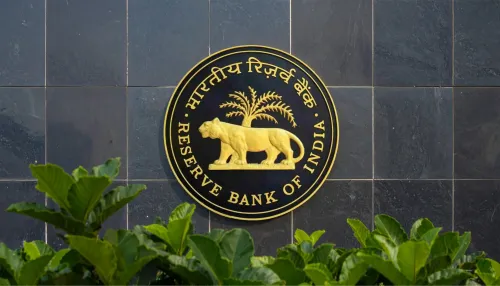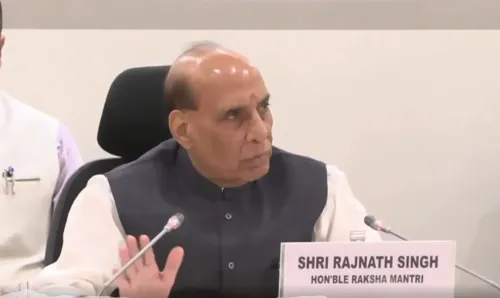Is Pakistan’s Major Bitcoin Initiative Facing Legal, Energy, and Fraud Obstacles?

Synopsis
Key Takeaways
- Pakistan's push into Bitcoin is ambitious but fraught with risks.
- Weak regulations and a history of fraud pose significant challenges.
- The establishment of the Pakistan Crypto Council is a step towards formal regulation.
- Energy supply issues may hinder Bitcoin mining growth.
- Investor protection and transparency are critical for success.
New Delhi, Oct 5 (NationPress) Pakistan's bold venture into Bitcoin and digital finance is raising alarms among experts, as the nation battles inadequate regulations, energy obstacles, and a troubling history of crypto-related fraud.
While the government aspires to utilize Bitcoin as a national savings tool and draw in foreign investments, analysts caution that this initiative could be hasty and loaded with risks.
In March 2025, the government launched the Pakistan Crypto Council (PCC), headed by Bilal Bin Saqib, the State Minister for Crypto & Blockchain, according to a report by Financial Post.
Subsequently, in May 2025, Pakistan unveiled its first government-directed Strategic Bitcoin Reserve during the Bitcoin 2025 conference in Las Vegas.
In tandem with the PCC, the Pakistan Digital Assets Authority (PDAA) was established to formulate regulations for cryptocurrencies, digital wallets, and blockchain systems.
These bodies aim to formalize and leverage the potential of digital assets, with intentions to utilize Bitcoin as a national savings method.
The announcement of a strategic Bitcoin reserve has taken global markets by surprise, the report indicated.
However, doubts emerge regarding whether the government has acted too soon, revealing its plans without establishing the necessary groundwork.
The success of this strategy hinges on Pakistan's capacity to create a clear and enforceable regulatory framework that can safeguard investors and guarantee transparency.
Pakistan's energy sector is facing challenges, including long-term contracts and decreasing demand, compelling the government to pay over $7 billion annually for unused electricity.
In response, the government intends to channel this surplus power towards Bitcoin mining and AI data centers, with the goal of monetizing idle energy, attracting foreign investments, and generating tech-oriented employment.
Global interest has surged, with international Bitcoin miners and data infrastructure companies reportedly seeking collaborations with the PCC.
In June 2025, Pakistan signed agreements with Trump-backed crypto venture World Liberty Financial (WLF) and Binance to enhance blockchain infrastructure and promote decentralized finance (DeFi).
Nonetheless, the plan encounters hurdles. Bitcoin mining is energy-intensive, and Pakistan's grid, predominantly reliant on fossil fuels, raises environmental issues.
The International Monetary Fund (IMF) has already rejected certain elements of the crypto power subsidy plan, indicating potential financial and diplomatic tensions.
Moreover, logistical challenges within Pakistan's electricity infrastructure, such as frequent blackouts and unreliable supply, could obstruct the success of the Bitcoin reserve.
Pakistan's economic struggles, escalating inflation, increasing debt, and dwindling industrial activity render the crypto shift appear like a desperate attempt to leap into prosperity.
However, the foundation is fragile. The State Bank of Pakistan has historically discouraged crypto trading, and the legal framework remains underdeveloped.
Without clear legal protections, investors are at risk of account freezes, bans, and limited recourse in instances of fraud.
The volatility of cryptocurrencies further intensifies the risk, with abrupt price fluctuations capable of erasing investments in an instant.
Security concerns are significant, particularly given Binance's global scrutiny over anti-money laundering violations and WLF's political connections, which raise issues regarding governance and transparency.
Pakistan's crypto landscape is also shadowed by a history of fraud. In January 2022, one of the country's largest cryptocurrency scams resulted in losses totaling $100 million for investors.
Fraudulent mobile applications deceived individuals into investment schemes, encouraging them to transfer funds from Binance wallets to fake platforms. When these apps collapsed, thousands found themselves locked out of their investments.
The situation has only deteriorated. In 2024 alone, over 11,000 bank accounts were frozen due to crypto-related fraud, with 90 percent of victims unaware they were part of illicit transaction networks.
Recovery has been slow and challenging, with merely 15 percent of accounts restored, and traders who declare crypto transactions often face permanent bans.
Environmental sustainability adds another layer of complexity. Bitcoin mining is notoriously energy-intensive, and Pakistan's dependence on fossil-fueled power grids raises serious climate concerns.
The IMF has reportedly rejected aspects of Pakistan's crypto power subsidy plan, hinting at possible financial complications and international resistance, the report stated.








